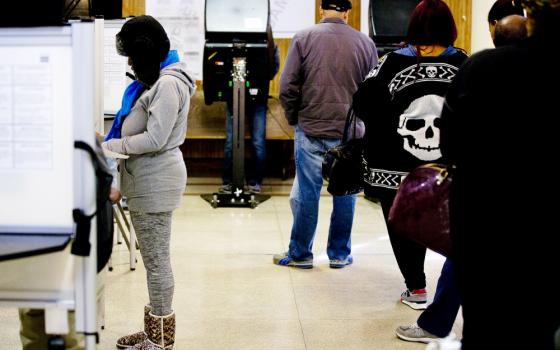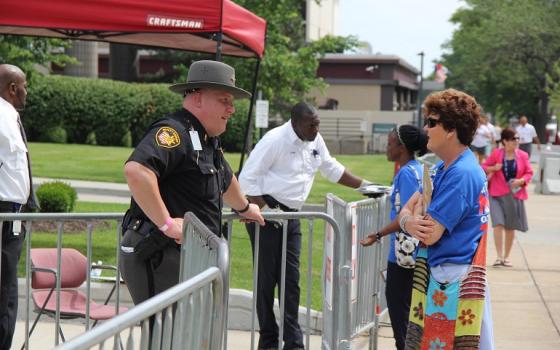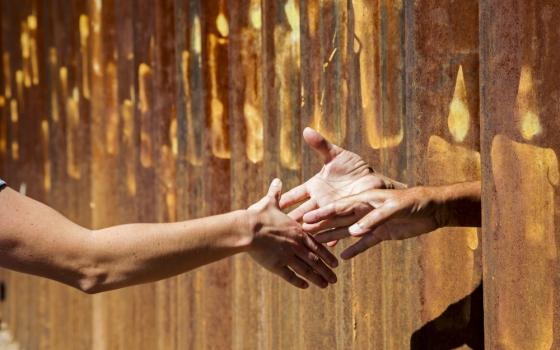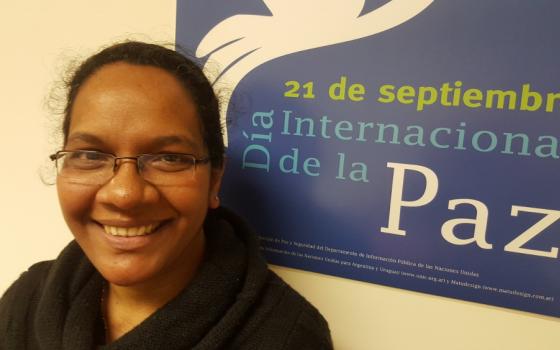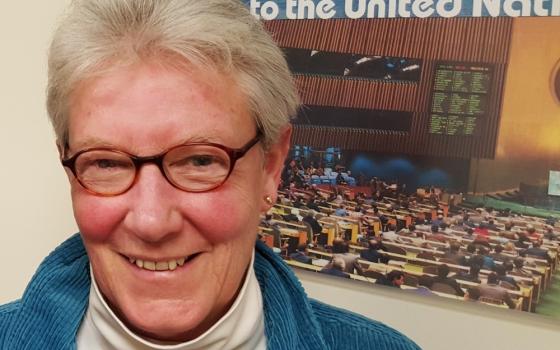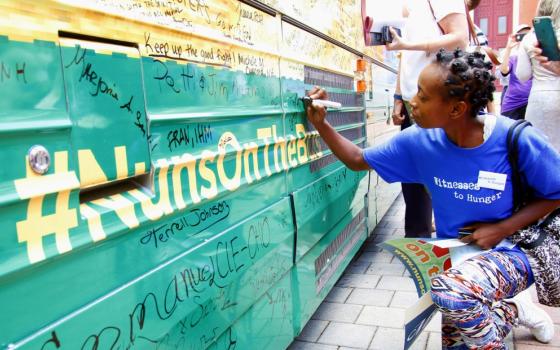Many women religious in the United States are trying to find hope in the phrase "President-elect Donald Trump."
His Nov. 9 victory over Democratic nominee Hillary Clinton, who had been favored in most polls as the winner, stunned pollsters, pundits, the general electorate and the world.
Though having lost the popular vote, Trump will be sworn in Jan. 20, 2017, as the 45th president of the U.S., with a Republican-controlled Senate and House of Representatives behind him.
Despite having been on the campaign trail for more than 16 months, Trump's concrete policy proposals still leave much to the imagination for those working in social justice ministries.
Daughter of Charity Mary Ellen Lacy, who works as a public housing attorney in East St. Louis, Ill., said she has a "general idea" what consequences a Trump administration could have on her federally funded ministry, though Trump has spoken very little on his plans for the poor and his attitude toward entitlement programs.
"When you make decisions about programs that affect people and don't know how they live or where they come from, you run the risk of not making the best decisions," she said. "My hope and prayer for him is that he'll get to know the plight of the poor before making rash judgments that some people who don't know anything about the poor make."
Lacy said to remember that "we didn't elect God last night; we elected a president, and the God who was there yesterday morning is the same God today."
Though Trump's campaign has provided few specifics regarding his policy proposals, one priority on his presidential agenda has been made clear since the day he announced his candidacy: immigration, most commonly addressed in his promise to build a border wall and conduct mass deportations.
Andrea Koverman, a Sister of Charity of Cincinnati who currently ministers at the Intercommunity Justice and Peace Center in Cincinnati, said she worries that things will get even worse for immigrants.
"I do worry things are going to change for a lot of people," Koverman said. "I also worry about the tone with a leader in office who doesn't believe in respectful dialogue. But we will keep doing what we do," she said, adding that "faith drives everything we do, our values and how we live that out. That doesn't change no matter who's president."
Several sisters representing their congregations at the United Nations expressed shock and disappointment at Trump's election, saying they are worried about what it might portend for the U.S. role at the U.N.
"This election will have a critical impact within and outside of America and at the United Nations and its values," said Sr. Justine Gitanjali Senapati, who represents the Congregations of St. Joseph at the United Nations.
As a "charter member of the United Nations and one of the five permanent members of the U.N. Security Council," the U.S. has represented stability to the U.N., she said. That may now be in question as Trump did not, as a candidate, advocate for a globalist vision of the U.S. role in the world, she told GSR.
By contrast, Senapati said, Clinton was an advocate for many of the issues important to the sisters at the U.N., famously declaring at the 1995 U.N. conference on women at Beijing that "women's rights are human rights."
Senapati said had Clinton been elected, the "economic and social status of women and girls," as well as issues related to migrants and refugees, could have been spotlighted even further, given the former secretary of state's prominence and support for humanitarian causes in general.
As for Trump, the president-elect's attitude toward immigrants and refugees is deeply troubling, Senapati said. "How many of the migrants, refugees, women are going to be safe in this country?" she asked.
Also worrisome to Senapati — who, like other sisters at the U.N., work on issues related to women — are Trump's attitudes that she said belittle women.
"If his talks and speeches can be so rebellious, arrogant, aggressive, full of intolerance and without self-control and truth, how much will his actions and consequences affect the world in the future?" she said.
As a prison reform advocate in St. Paul, Minnesota, Sr. Baya Clare, a sister of St. Joseph of Carondelet, said that mass incarceration is a symptom of a "fundamental racism at the heart of our country," which she thinks will get worse under a Trump presidency.
"I think we're going to go backwards with regard to a lot of issues of human dignity, and I think one of them is mass incarceration," she said. "There is this flaw at the heart of this country, and maybe the only way to heal that is to break apart. And I think that might be happening ... I'm just not sure if we're strong enough to withstand what has happened in this election."
Dominican Sr. Margaret Mayce, who serves as the representative of the Dominican Leadership Conference at the U.N., said that though her "disappointment is deeper than words," she keeps wondering "about a phrase that we often hear referring to those elected to congregational leadership: that they receive 'the grace of the office.' "
She added: "Might this happen to Donald Trump? Is there anything I can do, or that we, as women religious, can do to open the channels for this grace to flow through him? So many of us have embraced the importance of communal contemplation and dialogue in our lives. Could we ever be of service to a national effort to foster unity in the wake of such a bitter and divisive election? Would we be up to the challenge?"
St. Ursula Sr. Erin Zubal, a grade-school principal in Cleveland, said that sisters have been a "healing force" in the world for a long time, a result of their "micro and macro work coming together."
"We can only do it one day at a time, and that's what I have to remind myself: that it's a sacred journey and it takes one step every day and recommitting ourselves to the 'yes' that we said together as women religious," she said.
"Our lay partners are a vital part of this. It's not just us as women religious, it's us and everyone who supports our ministries and are partnering with us every day to do the work of the Gospel."
Difficult times have knitted communities of women religious more tightly, said prison reform advocate Clare. The Vatican's controversial investigation of U.S. women religious brought communities closer together and that newfound network will help them to form a resistance movement against whatever new oppressions may arise under a Trump presidency.
"Those kinds of networks are a strong thing when you need a resistance movement and when you're trying to be doing the right thing and upholding human dignity in the face of some kind of significant institutional juggernaut against it," she said.
"And I think those things are going to help us, too. In some ways, we're kind of invisible, and in some kind of perverse way, that's actually a good thing. You can do a lot if you're flying under the radar and you have a good network. So that does give me hope."
Lacy said that although religious women at this time "have to be who we claim to be" and serve as examples to others, she finds comfort in recalling her experience with Nuns on the Bus, as they traveled to the two parties' conventions. There, she found that everyone has the same "hopes, values and fears. ... We have those commonalities. We just have to come together and address that," she said.
"You either believe we are our brothers' and sisters' keepers, or you don't. ... But you don't get to take your bow and go home."
Lacy cited Clinton's concession speech, delivered the morning of Nov. 9, and said it gave her hope: "I have to believe she is in great pain right now, and yet she gave from her want, not from her surplus. If we can all do that in the face of great pain and strife, can you imagine our world?
"That would make a community. That's when you're going see the America we can truly become."
[Contributing to this article were GSR writers Soli Salgado, Dawn Araujo-Hawkins, Chris Herlinger and Dan Stockman.]
